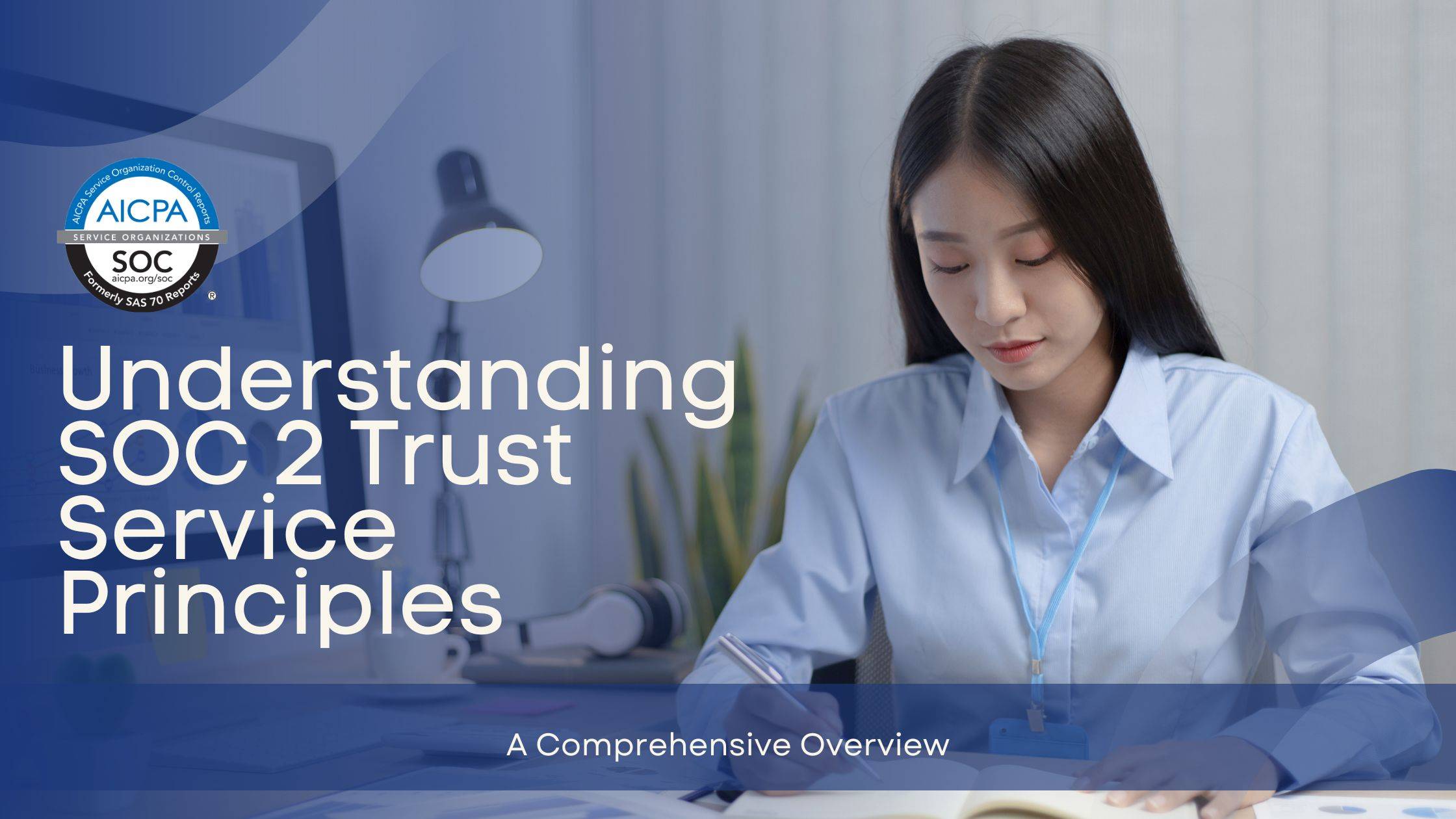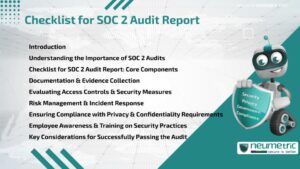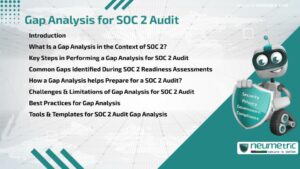Table of Contents
ToggleUnderstanding SOC 2 Trust Service Principles: A Comprehensive Overview
Introduction
Service Organisation Control 2 [SOC 2] is an Auditing Framework developed by the American Institute of Certified Public Accountants [AICPA] that measures a Service Organisation’s ability to protect Customer Data & maintain the Privacy & Security of information. It is a framework that provides information to users of financial statements about the quality of management, operational & control systems & the corporation’s processes.
The primary objective of SOC 2 is to provide assurance to clients, stakeholders & regulators that a Service Organisation has established adequate controls to safeguard the data & systems it manages on behalf of its clients. These reports are especially important for organisations that provide services involving sensitive information such as financial, healthcare, or personal data.
Trust Service Principles [TSPs] are a set of criteria that form the basis of the SOC 2 Audit. Trust Service Principles [TSPs] are used to evaluate a Service Organisation’s internal controls related to Security, Availability, Processing Integrity, Confidentiality & Privacy. The SOC 2 Audit assesses a Service Organisation’s adherence to these Trust Service Principles [TSPs] & provides assurance to clients, stakeholders & regulators that the organisation has implemented adequate controls to protect its clients’ data & systems.
SOC 2 Trust Service Principles Overview
The five Trust Service Principles [TSPs] are:
- Security: This Principle examines how the organisation protects its systems & data from unauthorised access, disclosure & misuse. The Security Principle refers to the measures & controls implemented by a Service Organisation to protect its systems & data from unauthorised access, disclosure, alteration & destruction. This Principle includes Access controls, Network Security, Data Encryption & Incident Management. Ensuring Security is crucial in protecting sensitive data from breaches, data theft & unauthorised access.
- Availability: This Principle evaluates the organisation’s ability to ensure that its systems & services are available for operation & use as agreed upon with its clients. The Availability Principle evaluates the Service Organisation’s ability to provide its systems & services in accordance with the agreed-upon Service Level Agreements [SLAs] with clients. This Principle includes the organisation’s Business Continuity & Disaster Recovery plans, system maintenance procedures & monitoring & reporting mechanisms. Ensuring Availability is critical in minimising downtime, disruptions & service outages.
- Processing Integrity: This Principle examines how the organisation ensures that its systems & services are Complete, Accurate, Timely & Authorised. The Processing Integrity Principle refers to the Accuracy, Completeness & Timeliness of the organisation’s data processing. This Principle includes controls to ensure that data is processed according to established procedures & controls to detect & correct errors. Processing Integrity is essential in maintaining the Accuracy & Completeness of data, which is critical in making informed decisions & complying with legal & regulatory requirements.
- Confidentiality: This Principle evaluates how the organisation protects the confidential information it processes or maintains from unauthorised disclosure. The Confidentiality Principle evaluates the Service Organisation’s measures to protect the Confidentiality of data it processes or maintains. This Principle includes Access controls, Data Encryption, Confidentiality agreements & monitoring & reporting mechanisms. Confidentiality is vital in protecting sensitive data from unauthorised access, disclosure & misuse.
- Privacy: This Principle examines how the organisation manages personal information in accordance with the privacy notice & other commitments made to individuals. The Privacy Principle evaluates the Service Organisation’s measures to protect personal information in accordance with its privacy notice & other commitments made to individuals. This Principle includes data collection, use, retention & disposal policies, Access controls, Data Encryption & monitoring & reporting mechanisms. Protecting personal information is crucial in maintaining individuals’ trust & complying with legal & regulatory requirements.
Overall, The SOC 2 Trust Service Principles assure clients, stakeholders & regulators that organisations have implemented adequate controls to safeguard client data & systems, helping to mitigate risks like data breaches & theft. By adhering to these principles, organisations can build clients’ trust.
Security Principle
The Security Principle is used in SOC 2 Audits to evaluate the controls that Service Organisations have in place to protect the Confidentiality, Integrity & Availability of their systems & the data they process, store or transmit.
The Security Principle requires a range of controls to protect against unauthorised access, theft, destruction & other malicious activities that could compromise organisation’s systems & data, including sensitive Personally Identifiable Information [PII] or Protected Health Information [PHI]. Effective Security controls must be designed, implemented & operated properly.
Some of the key areas that the Security Principle covers include:
- Access Controls: Organisations must have policies & procedures in place to manage user access to their systems & data. This includes ensuring that only authorised users have access to the systems & data they need to perform their job functions.
- Network Security: Organisations need Network Security controls (e.g Firewalls, Intrusion Detection/Prevention systems, segmentation) to safeguard systems & data from external threats.
- Data Protection: Organisations must implement appropriate controls to protect the Confidentiality, Integrity & Availability of their data. This includes Encryption, Data Backup & Disaster Recovery planning.
- Physical Security: Organisations must implement appropriate Physical Security controls to protect their facilities, systems & data from unauthorised access, theft, or damage.
- Security Awareness Training: Organisations must provide Security Awareness Training to their employees to ensure that they understand the importance of Security & the risks associated with their job functions.
Implementing strong Security controls can provide many benefits to Service Organisations, including:
- Mitigating Security risks
- Enhancing Customer Trust
- Compliance with Regulations
- Cost Savings
Availability Principle
The Availability Principle is used in SOC 2 Audits to evaluate the controls that Service Organisations have in place to ensure that their systems & services are available for operation & use as agreed upon with their clients. This Principle assesses the organisation’s ability to provide reliable & uninterrupted services, minimise downtime & recover from disruptions or outages.
To comply with the Availability Principle, Service Organisations must ensure System & Service Availability by implementing appropriate controls, such as:
- Business Continuity & Disaster Recovery Plans: Organisations should have plans that outline how they will respond to disruptions & recover their systems & services in the event of a disaster or outage.
- Redundancy: Organisations may deploy redundant systems, networks & infrastructure to ensure that services remain available even in the event of a failure or outage.
- Service Level Agreements [SLAs]: Organisations may establish SLAs with their clients that define the level of Availability they guarantee for their services & the penalties for failing to meet these levels.
- Monitoring & Reporting: Organisations may implement tools & processes to continuously Monitor their systems & services & Report any issues that may affect Availability to their clients.
By implementing strong Availability controls, Service Organisations can be benefited in following ways:
- Increased Reliability
- Minimised Downtime
- Improved Disaster Recovery
- Improved Compliance
Processing Integrity Principle
The Processing Integrity Principle is used in SOC 2 Audits to evaluate the controls that Service Organisations have in place to ensure that their systems & processes are accurate, complete, timely & authorised. This Principle assesses the organisation’s ability to maintain the Integrity of the data it processes, as well as the effectiveness of its controls to prevent errors, omissions, or unauthorised changes to the data.
Processing Integrity is crucial for organisations processing sensitive data (e.g., Financial, Healthcare, E-commerce) to minimise risks such as data breaches, Compliance violations & reputational harm.
To comply with the Processing Integrity Principle, Service Organisations must implement controls to ensure accurate, complete, timely & authorised processing, such as:
- Data Validation Controls: Organisations may implement controls to validate the accuracy, completeness & consistency of data at various stages of processing, such as Input, Processing & Output.
- Segregation of Duties: Organisations may separate duties among different individuals or teams to prevent any one person from having complete control over a process, which could increase the risk of errors or unauthorised changes.
- Access Controls: Organisations may implement controls to limit access to data & systems only to authorised individuals, ensuring that processing is performed by authorised individuals only.
- Error Handling Procedures: Organisations may establish procedures to detect, correct & prevent errors in processing, minimising the risk of Data Integrity issues.
By implementing strong Processing Integrity controls, Service Organisations can benefit in the following ways:
- Increased Data Accuracy & Completeness
- Improved Risk Management
- Enhanced Trust & Reputation
- Compliance with Regulatory Requirements
Confidentiality Principle
The Confidentiality Principle is used in SOC 2 Audits to evaluate the controls that Service Organisations have in place to protect the Confidentiality of their clients’ sensitive data. The Principle assesses the organisation’s ability to protect data from unauthorised access, disclosure & destruction.
Confidentiality is crucial for organisations handling sensitive data (e.g., personal, financial, intellectual property) as unauthorised disclosure can cause severe reputational damage, financial loss & legal issues.
To comply with the Confidentiality Principle, Service Organisations must implement controls to ensure client data confidentiality, such as:
- Access Controls: Organisations may limit access to sensitive data to only authorised personnel & implement strong password policies & multi-factor authentication to prevent unauthorised access.
- Encryption: Organisations may encrypt sensitive data both in transit & at rest to protect against unauthorised access.
- Data Classification & Labelling: Organisations may classify data based on its sensitivity & label it appropriately to ensure that it is handled & stored according to its classification.
- Monitoring & Logging: Organisations may implement tools & processes to monitor & log access to sensitive data to detect unauthorised access & identify potential security incidents.
By implementing strong Confidentiality controls, Service Organisations can benefit in the following ways:
- Protection of Sensitive Data
- Maintaining client trust & confidence
- Compliance with Data Protection Regulations
- Reduced risk of data breaches & associated costs
Privacy Principle
The Privacy Principle is used in SOC 2 Audits to evaluate the controls that Service Organisations have in place to protect the Privacy of Personal Information that they collect, use, disclose & store. The Principle assesses the organisation’s ability to meet the commitments in its privacy notice & comply with applicable privacy laws & regulations.
To comply with the Privacy Principle, Service Organisations must implement controls to ensure Personal Information privacy, such as:
- Privacy Policies & Notices: Organisations should develop & communicate Privacy Policies & notices that inform individuals about how their Personal Information is collected, used, disclosed & stored.
- Data Minimization: Organisations should collect & retain only the Personal Information that is necessary to achieve the purposes for which it is being processed.
- Access Controls: Organisations should implement Access Controls to limit access to Personal Information only to those individuals who need it to perform their job functions.
- Data Encryption: Organisations may implement data encryption technologies to protect Personal Information both in transit & at rest.
- Incident Response Plan: Organisations should develop & implement an Incident Response Plan that outlines the procedures to follow in the event of a privacy breach.
By implementing strong Privacy controls, Service Organisations can benefit in the following ways:
- Improved Customer Trust
- Compliance with Laws & Regulations
- Reduced risk of Privacy Breaches
- Competitive Advantage
Conclusion
In conclusion, SOC 2 Compliance is essential for Service Organisations that handle sensitive data such as financial, healthcare, or personal data. The Trust Service Principles [TSPs] provide a set of criteria for the SOC 2 Audit to evaluate a Service Organisation’s controls related to Security, Availability, Processing Integrity, Confidentiality & Privacy. Adherence to these principles can help organisations build trust with their clients & reduce the risk of breaches & other security incidents.
The Security Principle is one of the five Trust Service Principles [TSPs] used in SOC 2 Audits to evaluate the controls that Service Organisations have in place to protect the Confidentiality, Integrity & Availability of their systems & data. Organisations must prioritise SOC 2 Compliance & implement strong controls to safeguard customer data & maintain the Privacy & Security of information.
FAQs
What are the Trust Principles Criteria?
There are five Trust Service Principles, or Trust Services Criteria [TSC], that a business is going to be evaluated for when auditing for SOC 2 – Security, Availability, Confidentiality, Processing Integrity & Privacy.
What is the Trust Services Framework?
The Trust Services Framework is a set of Guidelines & Standards designed to help organisations establish & maintain a secure & reliable digital environment for their operations, transactions & interactions with stakeholders.
What is AICPA Trust Services Principles & Criteria?
The AICPA Trust Services Principles & Criteria are a set of standards developed by the American Institute of Certified Public Accountants [AICPA] to guide organisations in implementing & reporting on effective controls related to Security, Availability, Processing Integrity, Confidentiality & Privacy of their information systems & data. The Trust Service Principles & Criteria are commonly used to evaluate & report on the effectiveness of controls in Service Organisations, such as data centres, managed service providers & cloud service providers.
What are Trust Service Categories?
Trust Service Categories are a set of criteria used to evaluate the Security, Availability, Processing Integrity, Confidentiality & Privacy of a Service Organisation’s system. These categories are defined by the American Institute of Certified Public Accountants [AICPA] & are used as part of the Trust Services Framework to provide assurance to stakeholders that the Service Organisation is operating securely & is in Compliance with relevant standards & regulations.





